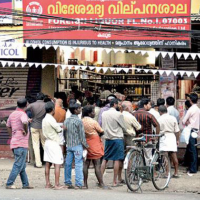Kerala Chooses Prohibition Instead of Reducing Alcohol Consumption Sensibly
 People queuing outside a liquor store in Kerala (file photo: PTI)
People queuing outside a liquor store in Kerala (file photo: PTI)
The state with the highest per capita consumption of alcohol, Kerala, has announced a clampdown on the availability of liquor and will usher in full prohibition within 10 years. Chief Minister Oommen Chandy said on Thursday that liquor bars would be restricted to five star hotels from April 1, 2015 and the states’ 418 retail liquor shops would be reduced by 10 percent every year, paving the way for a liquor-free Kerala.
But the experience with prohibition elsewhere in the world – and also in Indian states such as Gujarat and Haryana – is that banning alcohol does not stop alcohol consumption. It merely creates a bootlegging industry, forces people to resort to dangerous locally-brewed liquor, and reduces the revenues of the state.
According to recent studies, Kerala residents drank 11.1 litres of alcohol per person in 2010-11. With the mean age of consumption of liquor falling to 15 years, it is not surprising that the anti-liquor movement has gained momentum.
According to BBC News, doctors and activists have blamed rising alcohol abuse for divorce cases and road deaths. Hospitals and rehab centres are reportedly packed with patients suffering from alcohol-related diseases.
Yet the real reason behind the state administration’s sudden announcement is not social or economic, but political. The factional fight between Chandy and the state Congress chief VM Sudheeran has forced the administration’s hand, as Sudheeran’s stand against the renewal of liquor bar licenses had received support from the Catholic Church and the Indian Union Muslim League, the chief constituent of the ruling United Democratic Front (UDF).
With Muslim and Christian groups calling for prohibition, the ruling Congress party has calculated that prohibition would bring in votes from these communities. The Catholic Church has already hailed Chandy’s announcement as a "historic decision".
But the proposed prohibition policy has been criticised for its potential impact on tourism, which is one of the largest employers in the state. Jose Dominic, managing director of the CGH Earth group of hotels, told the Economic Times that the policy would affect law and order and destroy tourism.
Sanjay Vijayakumar, a young entrepreneur and chairman of the Start-Up Village, said with the legal availability of alcohol drying up, the youth in the state would shift to other intoxicants like marijuana. Interestingly, toddy, the traditional coconut palm drink in Kerala, will not be covered by prohibition.
The administration has also not specified how it plans to recover lost earnings from the sale of alcohol, which currently accounts for more than 20 percent of Kerala’s annual revenues.
- Top Stories
- Controversies
- Where is the Money Going?
- India and the World
- Appointments and Resignations
- Unusual News
- Latest News
- India College Chain’s Expansion into U.S. Draws Opposition from Massachusetts Officials over Quality of Education
- Milk Shortages in India Tied to Release of New Movies Featuring Nation’s Favorite Stars
- Confusion Swirls around Kashmir Newspaper Ban in Wake of Violent Street Protests
- Polio-Free for 5 Years, India Launches Vaccine Drive after Polio Strain Discovery
- New Aviation Policy Could Increase Service, Lower Ticket Prices






Comments